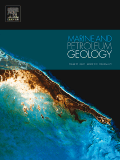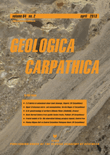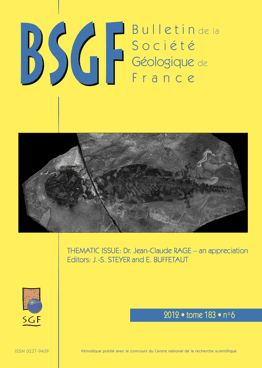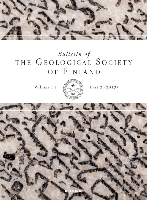
Journal of Sedimentary Environments
metrics 2024
Unveiling the Secrets of Sedimentary Environments.
Introduction
Journal of Sedimentary Environments is a leading open-access publication dedicated to advancing the study of sedimentary processes and environments. Published by SPRINGER HEIDELBERG, this journal embraces a wide array of topics including sedimentology, paleoenvironments, and the interactions between sediments and ecosystems. Since its transition to open access in 2016, it has prioritized making high-quality research widely available, fostering collaboration and innovation among researchers, professionals, and students in the field. With a commitment to excellence, the journal aims to publish groundbreaking studies that enhance our understanding of sedimentary environments, making it an essential resource for anyone interested in the dynamics of Earth’s sedimentary systems. Located in Heidelberg, Germany, this journal is poised to play a vital role in shaping current and future research discussions worldwide.
Metrics 2024
 -
- 1.20
1.20 1.20
1.20 -
-Metrics History
Rank 2024
IF (Web Of Science)
JCI (Web Of Science)
Quartile History
Similar Journals

MARINE AND PETROLEUM GEOLOGY
Uncovering the Secrets of Our Planet's ResourcesMarine and Petroleum Geology, published by Elsevier Science Ltd, is a premier, multidisciplinary journal that addresses critical advancements in the fields of geology, geophysics, oceanography, stratigraphy, and economic geology. With an impressive 2023 impact factor reflecting its influence across these vital domains, this journal maintains a prestigious standing, having achieved a Q1 ranking in multiple categories, including Economic Geology and Geophysics. Since its inception in 1984, it has been a key platform for researchers and practitioners to disseminate innovative findings, foster interdisciplinary dialogue, and enhance our understanding of geological processes affecting marine and petroleum resources. The journal is particularly valuable for those looking to stay abreast of the latest developments in Earth sciences, contributing to both academic knowledge and practical applications. Available through traditional subscription access, it serves as a cornerstone resource for scientists, students, and professionals eager to engage with cutting-edge research.

Gondwana Research
Exploring the Depths of Gondwana's Geological LegacyGondwana Research is a premier academic journal published by Elsevier, specializing in the field of geology, with a robust focus on the geological history and processes of the Gondwana supercontinent. With an impressive impact factor and ranking as Q1 in the 2023 Geology category, it stands as a leading platform for disseminating high-quality research. The journal features articles that advance the understanding of Earth and planetary sciences, making significant contributions to geological education and research. Researchers will find its curated content particularly valuable, as it encompasses a wide array of topics including stratigraphy, paleontology, and tectonics, all relevant to both contemporary and historical geological inquiries. Given its substantial reach and esteemed standing—ranked 5th out of 321 in its field—Gondwana Research plays a crucial role in fostering scientific exchange among global experts. Located in the United States with publication continuity from 1997 to 2024, this journal consistently attracts submissions from leading scientists, ensuring that its readership is kept at the forefront of geological discovery and innovation.

Frontiers of Earth Science
Innovating Insights into Our Planet's SystemsFrontiers of Earth Science is a prominent academic journal in the field of Earth and Planetary Sciences, published by Springer. With an ISSN of 2095-0195 and an E-ISSN of 2095-0209, this journal serves as a significant platform for researchers and professionals to disseminate their findings from 2007 to 2024. It is recognized for its impactful contributions within the category of Earth and Planetary Sciences, boasting a respected Q2 ranking in 2023. With a Scopus ranking of 64 out of 195, placing it in the 67th percentile, Frontiers of Earth Science continues to drive academic dialogue and innovation. The journal is dedicated to exploring a diverse range of topics, including geology, meteorology, and environmental science, and amplifying the understanding of Earth systems through rigorous research. Located in New York, USA, this journal embraces an Open Access model, ensuring that groundbreaking research is readily available to the global scientific community, thereby enhancing its accessibility and impact.

JOURNAL OF THE GEOLOGICAL SOCIETY OF INDIA
Exploring the depths of Earth's mysteries.JOURNAL OF THE GEOLOGICAL SOCIETY OF INDIA, published by Springer India, serves as a pivotal platform for researchers and practitioners in the field of geology. Established in 1979, this journal has been instrumental in advancing geological research throughout India, showcasing both regional studies and cutting-edge global research. With its Category Quartile ranking of Q3 in the geology category for 2023, and a significant Scopus rank of 171 among 321 journals in Earth and Planetary Sciences, it remains a respected source of scholarly activity. The journal is dedicated to the dissemination of original research articles, reviews, and case studies that encapsulate the dynamic scope of geological science, thus contributing to the understanding of geological phenomena. Although currently not offering open access, the journal maintains a commitment to high-quality scholarship and aims to engage a diverse readership, enhancing the knowledge and practice of geology across various disciplines.

FACIES
Unveiling Earth's Secrets: Where Research Meets DiscoveryFACIES is a prominent academic journal published by Springer, dedicated to advancing knowledge in the fields of Geology, Paleontology, and Stratigraphy. With its rich history since 1979 and an impactful convergence of research efforts extending through 2024, FACIES has established itself as a vital resource for scholars and practitioners. The journal boasts impressive ranking metrics: it is positioned in Q2 within Geology and Stratigraphy, and Q1 in Paleontology, reflecting its high-quality contributions to the academic community. Furthermore, its notable Scopus ranks—#28 in Paleontology, #16 in Stratigraphy, and #91 in Geology—underscore its influence and relevance. Although not an open-access journal, FACIES continues to provide significant findings that inform geological practices and enrich our understanding of past and present Earth systems. It serves as an essential platform for innovative research, making it invaluable for researchers, professionals, and students who seek to impact the fields of Earth sciences.

GEOLOGICA CARPATHICA
Illuminating Geological Insights for a Global AudienceGEOLOGICA CARPATHICA, with ISSN 1335-0552 and E-ISSN 1336-8052, is a distinguished open access journal published by the Slovak Academy of Sciences Geological Institute, serving as a pivotal platform for the dissemination of research in the field of Geology. Established in 1991 and continuing through 2024, the journal is recognized for its significant contributions to Earth and Planetary Sciences, evidenced by its 2023 Scopus ranking placing it in the second quartile (Q2) within Geology. With an H-index that showcases its impactful publications, GEOLOGICA CARPATHICA is committed to fostering scholarly communication while promoting accessible research, having adopted an open access model since 2009. Located in beautiful Bratislava, Slovakia, this journal aims to engage a global audience of researchers, professionals, and students interested in ecological, geological, and environmental studies, making it a prominent resource for enriching the scientific community's understanding of the Carpathian region and beyond.

BSGF-Earth Sciences Bulletin
Navigating the Depths of Earth Sciences ExcellenceWelcome to the BSGF-Earth Sciences Bulletin, a premier open-access journal published by EDP SCIENCES S A that has been illuminating the field of earth sciences since its inception. With an ISSN of 0037-9409 and an E-ISSN of 1777-5817, this journal has established itself as a vital platform for disseminating significant research findings and innovative studies in Earth and Planetary Sciences. Operating out of France, BSGF is recognized for its rigorous peer-review process and its commitment to accessibility, having transitioned to open access in 2018. This stature is reflected in its outstanding rankings, placing it in the Q1 quartile within both Earth and Planetary Sciences and Geology disciplines, and ranking #35/195 overall in the Scopus database. Researchers, professionals, and students alike will find the BSGF invaluable for its high-impact articles, which span a wide array of sub-disciplines, addressing both foundational concepts and contemporary challenges in earth sciences.

BULLETIN OF THE GEOLOGICAL SOCIETY OF FINLAND
Bridging disciplines to deepen our understanding of geology.BULLETIN OF THE GEOLOGICAL SOCIETY OF FINLAND, a distinguished publication in the field of Geology, has been at the forefront of scientific discourse since its inception. Published by the Geological Society of Finland, this journal offers an Open Access platform for researchers since 1968, ensuring that high-quality geological research is widely accessible. With an ISSN of 0367-5211 and E-ISSN 1799-4632, the journal aims to disseminate significant findings in Earth and planetary sciences, contributing to a richer understanding of geological phenomena. Situated in Finland and headquartered at the Finnish Museum of Natural History, University of Helsinki, it serves as a pivotal resource for professionals, students, and researchers, maintaining a respectable Q3 category rank in Geology as of 2023 within Scopus' metrics. The journal is committed to fostering the advancement of geology through rigorous peer-reviewed articles, innovative research methodologies, and interdisciplinary approaches, helping to bridge gaps in knowledge while inspiring new generations of geoscientists.

Depositional Record
Pioneering research at the intersection of geology and environmental science.Depositional Record, published by WILEY, stands as a vital resource for researchers and professionals in the fields of Geology, Paleontology, Oceanography, and Environmental Science. Since its inception in 2015, this Open Access journal has been dedicated to advancing the understanding of sedimentary processes, depositional environments, and their implications on Earth's history and contemporary climate dynamics. With an impressive array of categorizations, including Q1 rankings in Geology, Paleontology, and Stratigraphy, it underscores its significant contribution to these scientific arenas. The journal’s reach is reflected in its Scopus rankings, placing it within the top quartiles in multiple categories, indicating the high quality and impact of its published research. Researchers, students, and professionals who engage with Depositional Record will find a treasure trove of knowledge aimed at informing best practices, innovative studies, and fostering an interdisciplinary dialogue crucial for environmental stewardship and geological exploration.

GEOLOGICA ACTA
Connecting scholars, shaping geological innovation.GEOLOGICA ACTA is a distinguished open-access journal dedicated to the field of geology, published by Universitat de Barcelona since its inception in 2003. With an impact factor that reflects its relevance in the academic community and a commendable Q2 ranking within the Earth and Planetary Sciences category, this journal is committed to disseminating high-quality research that spans various aspects of geological sciences. The journal's broad scope encompasses both theoretical and applied research, making it a vital platform for researchers, professionals, and students alike to share their findings with a global audience. With its Open Access policy, GEOLOGICA ACTA ensures that all published articles are freely accessible, fostering collaboration and innovation in the geological community. Based in Barcelona, Spain, at the Geociences Barcelona (CSIC), it plays a pivotal role in connecting scholars from diverse backgrounds and advancing the field of geology through rigorous peer-reviewed articles.